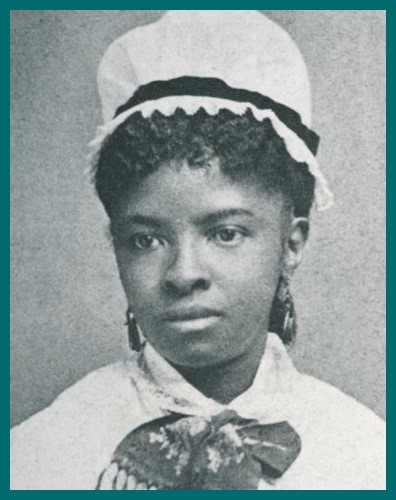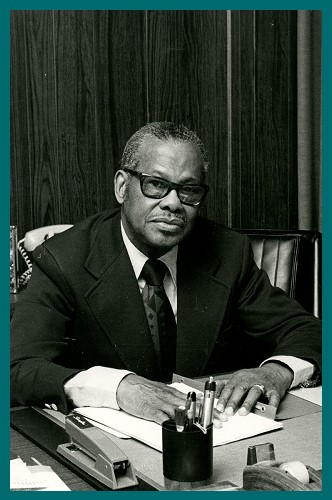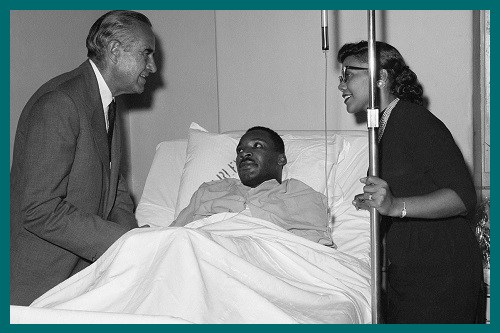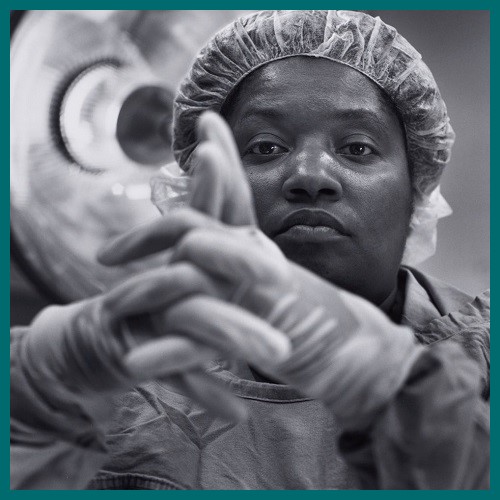Celebrating Black Leaders in Healthcare
In honor of Black History Month, we are taking a moment to commemorate Black leaders in healthcare. Join us as we examine the lives, work and achievements of four truly inspirational figures that changed the healthcare landscape for the better.
Black Leaders in Healthcare
Mary Eliza Mahoney, Professional Nurse
Mary Eliza Mahoney was born in the spring of 1845. Her parents were freed slaves that had moved to Boston, Massachusetts from North Carolina. During her early years, Mahoney attended the Phillips School in Boston, which after 1855, became one of the first integrated schools in the country.
was born in the spring of 1845. Her parents were freed slaves that had moved to Boston, Massachusetts from North Carolina. During her early years, Mahoney attended the Phillips School in Boston, which after 1855, became one of the first integrated schools in the country.
As a teenager, Mahoney became interested in a career in nursing. She initially worked as an untrained practical nurse for several prominent white families before entering a formal training program. On March 23, 1878, Mahoney became the first Black woman to be admitted to the nursing program at the New England Hospital for Women and Children. The program ran for 16 months and was quite intensive. Students were required to attend lectures and work, resulting in 16-hour+ days.
Of the 42 students that entered the nursing program with Mahoney, only four graduated. When she received her diploma, Mahoney became the first Black American to earn a professional nursing license in the United States. After completing her formal training, Mahoney decided to pursue a career as a private nurse due to the overwhelming discrimination she encountered as a public nurse.
In 1896, Mahoney joined the Nurses Associated Alumane of the United States and Canada (NAAUSC), now known as the American Nurses Association (ANA). Comprised mostly of white members, Mahoney felt that an organization that advocated for the equality of African American nurses was needed. In 1908, she co-founded the National Association of Colored Graduate Nurses (NACGN) which was integrated into the ANA in 1949.
Numerous awards and memorials have been set up to recognize Mahoney’s trail-blazing spirit. In 1936, the NACGN founded the Mary Mahoney Award. This award, still given today, honors nurses or groups of nurses that promote integration within their field. Furthermore, Mahoney was inducted into the ANA’s Hall of Fame in 1976 and the National Women’s Hall of Fame in 1993.
Leonidas Harris Berry, MD
 A descendant of a self-liberated African who fought in the Civil War on the side of the Union army, Leonidas Harris Berry was born on July 20, 1902 in Woodsdale, North Carolina. His father, Llewellyn L. Berry, worked as an African Methodist Episcopal Church minister and his mother, Beulah Ann Harris, worked as a schoolteacher.
A descendant of a self-liberated African who fought in the Civil War on the side of the Union army, Leonidas Harris Berry was born on July 20, 1902 in Woodsdale, North Carolina. His father, Llewellyn L. Berry, worked as an African Methodist Episcopal Church minister and his mother, Beulah Ann Harris, worked as a schoolteacher.
Berry was an ambitious learner, earning two bachelor of science degrees: one from Wilberforce University in 1924 and one from the University of Chicago in 1925. Following the completion of his undergraduate studies, Berry went on to earn a medical degree from Rush Medical College in 1929 and a Master of Science in Pathology from the University of Illinois in 1933.
During his career, Berry blazed many new trails. He was the first black intern at Cook County Hospital in Chicago and the first black doctor on staff at the Michael Reese Hospital in Chicago. Furthermore, Berry served as the chairman of the Department of Medicine and the chairman of the Division of Gastroenterology at Provident Hospital, the first black-owned and operated hospital in the United States. He was also one of the first black doctors admitted to the previously all-white American Medical Association (AMA).
In addition to a distinguished career, Berry worked tirelessly to take care of his community. In the 1950s, he chaired a Chicago commission that worked to make hospitals more inclusive for black physicians and to increase medical facilities in the city’s underserved sectors. During the 1960s, Berry (along with two dozen other Chicago medical professionals) founded the Flying Black Medics, an organization that provided health and social services to the impoverished residents of Cairo, Illinois.
During his life, Berry received many awards and citations, including: University of Chicago Alumni Achievement Award, Rush Medical College Distinguished Service Award and the Freedom Award for Public Service from the Chicago Chapter of the NAACP.
Goldie D. Brangman, CRNA, MEd, MBA
 Goldie D. Brangman graduated from Harlem Hospital Center’s nursing program in 1943. Rampant racism within the profession and a dislike of bedside nursing initially had Brangman convinced she picked the wrong career. However, the United States’ entry into World War II would change her mind. As physician anesthetists were recruited for active duty, nurses were asked to take on the role. Brangman accepted a position as a nurse anesthetist and immediately fell in love with the specialty.
Goldie D. Brangman graduated from Harlem Hospital Center’s nursing program in 1943. Rampant racism within the profession and a dislike of bedside nursing initially had Brangman convinced she picked the wrong career. However, the United States’ entry into World War II would change her mind. As physician anesthetists were recruited for active duty, nurses were asked to take on the role. Brangman accepted a position as a nurse anesthetist and immediately fell in love with the specialty.
In 1951, Harlem Hospital decided to establish a school for nurse anesthetists. The program was one of the first of its kind in the country and boasted a diverse student population. Given her experience and success within the anesthesia field, Brangman was asked if she would be interested in leading the program. She gladly accepted the position and championed the program for 34 years.
On September 20, 1958, Brangman entered the pages of history when she assisted in a life-saving surgery on Dr. Martin Luther King, Jr. King had been in New York City for a book signing when a mentally unstable member of the crowd plunged a letter opener into his chest. He was immediately rushed to Harlem Hospital where Brangman worked as part of the anesthesia team. During the surgery, Brangman was responsible for operating the breathing bag that kept King alive.
In 1959, Brangman was elected president of the New York Association of Nurse Anesthetists. She later went on to serve as president of the American Association of Nurse Anesthetists (AANA). To this day, she is the only African American to serve as president of the AANA. Brangman was also honored with the AANA’s Agatha Hodgins Award for Outstanding Accomplishment in 1995. The award is given to those “whose foremost dedication to excellence has furthered the art and science of nurse anesthesia.”
Alexa Irene Canady, MD
 Born on November 7, 1950, in Lansing, Michigan, Alexa Irene Canady would eventually become the first black neurosurgeon in the United States. However, a crisis of confidence during her undergraduate days at the University of Michigan almost caused her to drop out of school. Thankfully, Canady pushed through her self-doubt and earned her Bachelor of Science in Zoology degree in 1971. She then went on to graduate from the University of Michigan’s medical school in 1975.
Born on November 7, 1950, in Lansing, Michigan, Alexa Irene Canady would eventually become the first black neurosurgeon in the United States. However, a crisis of confidence during her undergraduate days at the University of Michigan almost caused her to drop out of school. Thankfully, Canady pushed through her self-doubt and earned her Bachelor of Science in Zoology degree in 1971. She then went on to graduate from the University of Michigan’s medical school in 1975.
During the early days of her career as a neurosurgeon, Canady faced discrimination from patients and colleagues. On the first day of her residency at Yale-New Haven Hospital, one of the facility’s top administrators referred to Canady as “our new equal-opportunity package.” However, Canady did not allow these types of comments to deter her. A few years later, while working as a neurosurgeon at Children’s Hospital of Philadelphia, her fellow physicians voted her one of the top residents.
Canady had a long and distinguished career as a pediatric neurosurgeon. From 1987 through June 2001, she served as the chief of neurosurgery at the Children’s Hospital of Michigan. She worked tirelessly to develop a program that offered the highest level of care to the children of the Detroit community. Her retirement from medicine in 2001 was short lived when she decided to practice part-time at Sacred Heart Hospital in Pensacola, Florida (a community with a lack of pediatric neurosurgery services).
Canady holds two honorary degrees: a doctorate of humane letters from the University of Detroit-Mercy and a Doctor of Science degree from the University of Southern Connecticut. In 1984, Canady received the Children’s Hospital of Michigan’s Teacher of the Year award. She was inducted into the Michigan Women’s Hall of Fame in 1989. Furthermore, she received the President’s Award in 1993 from the American Medical Women’s Association (AMWA) and the Distinguished Service Award from Wayne State University Medical School in 1994.
We want to hear what you think. Comment below with a Black leader in healthcare that inspires you.
Want the latest industry news delivered to your inbox? Click here to subscribe to our newsletter.
Explore addition resources from Premier Medical Staffing Services:
Healthcare Predictions and Trends for 2022
Best Nursing Shoes
Dealing With Burnout
Skincare for Nurses
Finding Financial Freedom Through Travel Nursing